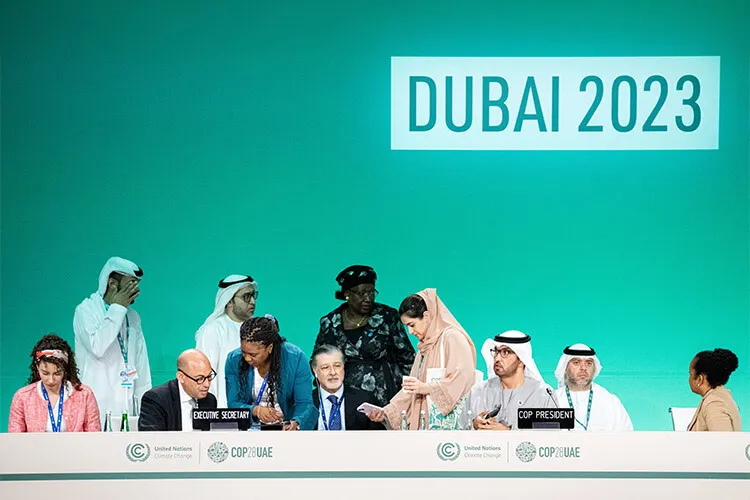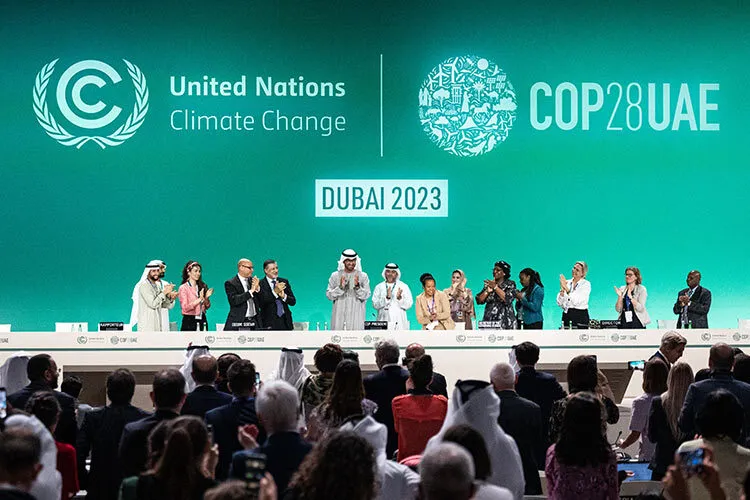After decades of discussions, the international community struck a landmark deal that calls for “transitioning away from fossil fuels” in the final declaration of the UN Climate Change Conference – but stopped short of demanding a “phase out.“
The 21-page COP28 declaration was published by the conference presidency from the United Arab Emirates (UAE) on Wednesday morning and adopted in plenary just a few hours later.
The text, however, does not call for a concrete “phase-out” of fossil fuels such as coal, oil and gas. More than 100 countries represented in Dubai had urged the inclusion of the more ambitious language.
Instead, it provides for the potential continued use of the fuels alongside controversial carbon capture and storage technologies.
COP28 Agreements
After two weeks of talks, a 24-hour extension and all-night negotiations, COP28 President Sultan al-Jaber, who is also the head of the UAE’s state oil company, spoke of the “historic package.“
“Future generations may not know your names but they will owe every single one of you a debt of gratitude,“ said al-Jaber. The agreed plan is to keep the 1.5-degree-Celsius target within reach, which was agreed internationally in Paris in 2015.
John Kerry, the climate envoy for one of the world’s biggest emitters (US), described the agreement as a successful step forward.
“Everyone here should feel good … I am in awe of the spirit of cooperation that has brought everybody together,“ said Kerry, who serves as US President Joe Biden’s climate czar.

Is it Good News?
Alicia Pérez-Porro, scientific coordinator at CREAF, an organization that attended COP28, stated, ‘It’s hard not to view the final COP28 text positively if we exclusively base it on the expectations most of us had for an agreement in a petrostate whose president, Sultan al-Jaber, not only chairs the Abu Dhabi National Oil Company but has also publicly denied the science behind calls for a gradual phase-out of fossil fuels. However, when dealing with a diplomatic instrument, the value lies in the details.’
According to the expert, the agreement won’t enable the world to maintain the 1.5°C limit because the countries at COP28 have agreed to move away from fossil fuels (the exact words in the final text are ‘transition away’) but do not commit to a total elimination (as requested by scientific institutions, climate activism, and the countries most affected by the climate emergency, calling for a ‘phase out’).
‘The positive side is that the result marks a significant moment for global climate action because this agreement makes it clear to all financial institutions, companies, and societies that we are finally – eight years behind what was established in Paris – at the true ‘beginning of the end’ of the fossil fuel-driven world economy.’
A Very Urgent Problem
Fernando Valladares, a Ph.D. in Biology, researcher at the Spanish National Research Council (CSIC), and associate professor at the University Rey Juan Carlos in Madrid, believes:
‘The agreement is historic in some aspects because, undoubtedly, it finally talks about transitioning toward the disappearance of our dependence on oil and fossil fuels. That is something historic. It is also historic that this has been achieved in an oil-producing country, with a summit president who is, in turn, the president of an oil company.’
However, Valladares agrees that the terms are not strong enough, as ‘reduce’ was used instead of ‘eliminate.’
He adds, ‘The main problem with this document and the resolutions reached is that they are not binding. It leaves countries free to do or not do, and there is no penalty or consequence for whether they do more or less. These two characteristics make these agreements barely a framework too lax for our situation, where climate change has accelerated at an extraordinary pace in the last two years.’ (With information from Reuters and SMC Es).

















